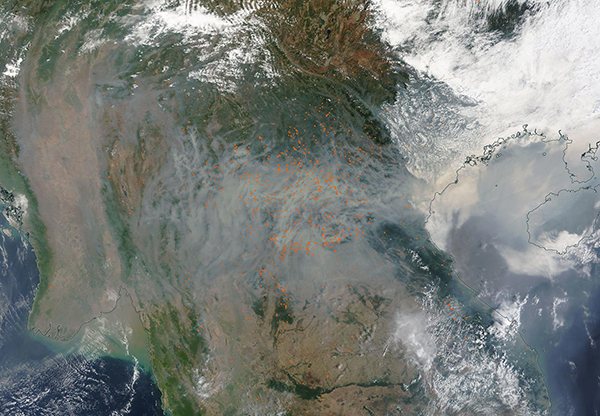Images
April 10, 2023 - Fires in Southeast Asia
Tweet
A thick gray pall from hundreds of fires burning in Southeast Asia blanketed the skies in early April 2023. The Moderate Resolution Imaging Spectroradiometer (MODIS) on board NASA’s Terra satellite acquired a true-color image of the intense air pollution on April 6.
Fires, marked in red, are scattered across (from west to east) Myanmar (Burma), Thailand, Laos, and Vietnam. Smoke spans the entire scene, but is especially thick over large parts of Laos, Thailand, and the South China Sea, including the island of Hainan, China.
Most of the fires in this image have undoubtedly been set for agricultural purposes, given the time of year and location. Fire has been part of land management practices in this area for hundreds or perhaps thousands of years, and are most abundant in late March to mid-April, which is the end of the dry season. While agricultural fires have benefits for land management and are not necessarily harmful in small numbers, they can escape to become damaging wildfires and, when burning is intense, can spawn air pollution that risks the health of both animals and people.
According to local media, as of March 28 there were at least two large wildfires burning in Laos. One was in Phou Khao Khuay mountain in the Pakngum district, Vientiane, where more than 400 people were fighting a blaze estimated at more than 300 hectares. The other was located in the Phou Phanang National Forest, Sangthong district and had spread through three villages. Several other wildfires have been reported, including one burning in Chiang Rai province of Thailand, northeast of Chiang Mai in early April.
The intense pollution from wildfires and agricultural fires prompted authorities in Thailand to urge people to work from home and avoid going outside. On April 7, Chiang Mai, Thailand was ranked the world’s most polluted city by the website IQAir, with levels of PM 2.5 particulates measured at more than 66 times the World Health Organization’s (WHO) guidelines. PM 2.5 refers to tiny particles suspended in air that are two and one-half microns or less in width. Such extremely tiny particles can travel deep within the lungs when inhaled, and have been associated with premature mortality, increased hospital admissions for heart or lung causes, acute and chronic bronchitis, asthma attacks, respiratory symptoms, and emergency room visits.
Image Facts
Satellite:
Terra
Date Acquired: 4/6/2023
Resolutions:
1km (401.7 KB), 500m (1.3 MB), 250m (4.2 MB)
Bands Used: 1,4,3
Image Credit:
MODIS Land Rapid Response Team, NASA GSFC
Tweet
A thick gray pall from hundreds of fires burning in Southeast Asia blanketed the skies in early April 2023. The Moderate Resolution Imaging Spectroradiometer (MODIS) on board NASA’s Terra satellite acquired a true-color image of the intense air pollution on April 6.
Fires, marked in red, are scattered across (from west to east) Myanmar (Burma), Thailand, Laos, and Vietnam. Smoke spans the entire scene, but is especially thick over large parts of Laos, Thailand, and the South China Sea, including the island of Hainan, China.
Most of the fires in this image have undoubtedly been set for agricultural purposes, given the time of year and location. Fire has been part of land management practices in this area for hundreds or perhaps thousands of years, and are most abundant in late March to mid-April, which is the end of the dry season. While agricultural fires have benefits for land management and are not necessarily harmful in small numbers, they can escape to become damaging wildfires and, when burning is intense, can spawn air pollution that risks the health of both animals and people.
According to local media, as of March 28 there were at least two large wildfires burning in Laos. One was in Phou Khao Khuay mountain in the Pakngum district, Vientiane, where more than 400 people were fighting a blaze estimated at more than 300 hectares. The other was located in the Phou Phanang National Forest, Sangthong district and had spread through three villages. Several other wildfires have been reported, including one burning in Chiang Rai province of Thailand, northeast of Chiang Mai in early April.
The intense pollution from wildfires and agricultural fires prompted authorities in Thailand to urge people to work from home and avoid going outside. On April 7, Chiang Mai, Thailand was ranked the world’s most polluted city by the website IQAir, with levels of PM 2.5 particulates measured at more than 66 times the World Health Organization’s (WHO) guidelines. PM 2.5 refers to tiny particles suspended in air that are two and one-half microns or less in width. Such extremely tiny particles can travel deep within the lungs when inhaled, and have been associated with premature mortality, increased hospital admissions for heart or lung causes, acute and chronic bronchitis, asthma attacks, respiratory symptoms, and emergency room visits.
Image Facts
Satellite:
Terra
Date Acquired: 4/6/2023
Resolutions:
1km (401.7 KB), 500m (1.3 MB), 250m (4.2 MB)
Bands Used: 1,4,3
Image Credit:
MODIS Land Rapid Response Team, NASA GSFC




